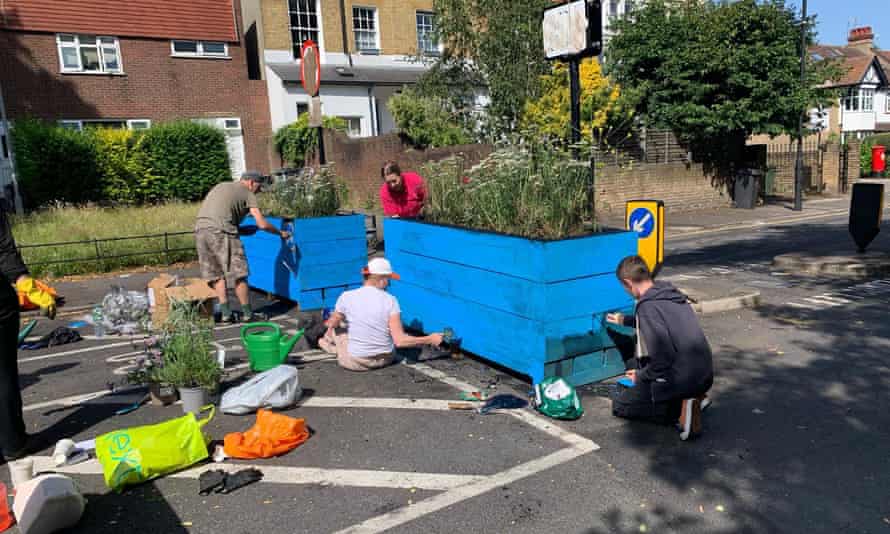London council to step up security as vandals target low-traffic zones
Lambeth authority to install extra CCTV and increase patrols to protect low-traffic neighbourhoods

Last modified on Mon 19 Jul 2021 09.53 EDT
A London council is to install extra CCTV cameras and step up security patrols following a spate of vandalism connected to low-traffic neighbourhood schemes (LTNs), after oil was poured over planters and on the street in the latest incident.
Lambeth authority said it would seek to prosecute anyone targeting the infrastructure, after other incidents in which plants have been pulled up, signs sprayed over and enforcement cameras damaged.
On Friday, oil was poured over wooden planters – used to limit access to some streets for motor vehicles while allowing pedestrians and cyclists to travel as normal – in Tulse Hill, south London.
Saddened to see the criminal damage to our local planters this morning. This has created a hazard outside a school and an eyesore for us all. Please RT in support of safer neighbourhoods. pic.twitter.com/dKFDsQkbNT
— Dr Simon Cathcart (@drsimonc)
Five LTNs are in place across the borough as part of a trial intended to discourage car use for shorter local trips and to reduce traffic flow along smaller residential streets, and the associated signs and infrastructure have been repeatedly vandalised.
Lambeth council said it would install more CCTV cameras and increase police and council patrols. Danny Adilypour, its joint lead on sustainable transport and environment, said: “People are entitled to express their views over our low-traffic neighbourhood trials, but there is no excuse for acts of criminal vandalism which put our residents at risk and this is not an effective way to engage with the council or fellow residents.”
The council also said vandalism could extend the duration of the schemes by causing delays.
In recent months, LTNs have become a highly contested issue, prompting occasional demonstrations and accusations that some schemes, installed during the peak of the coronavirus lockdown, were put in place without sufficient consultation.
Councils say they are necessary in part to unclog residential roads increasingly used as rat runs, often by drivers directed by navigation apps. Government figures show traffic on such roads has doubled since 2008.
While some academic studies suggest that, given enough time, properly implemented LTNs do gradually reduce amounts of motor traffic rather than redirecting it, opponents say this is not the case and that they can also delay emergency services.
Rosamund Kissi-Debrah, an air quality campaigner whose nine-year-old daughter Ella became the first person in the UK to have air pollution listed as a cause of death, has frequently voiced her opposition to LTNs. She has questioned whether it is “morally right” to funnel more traffic on to main roads.
She told the Times last year: “Main roads in urban areas are not motorways … lots and lots of people live on these roads that are already gridlocked. And lots of children that live in these areas have respiratory issues. Is it morally right to add more traffic to those roads? We have to ask that question.”
A series of councils, including Lambeth, are running consultations into the schemes. Adilypour said this would “give everyone a chance to have their say in a fair, reasoned way”.
Last month, the high court rejected a legal attempt on behalf of a Lambeth resident against a local LTN.
While many opponents of LTNs say they are widely unpopular, evidence for this is limited. Polling has shown generally broad support, while in May’s local elections a handful of anti-LTN candidates stood in byelections for London councils and attracted minimal support.
However, the noise generated by protests, and the accompanying media coverage, has persuaded some councils to rip out their LTNs.